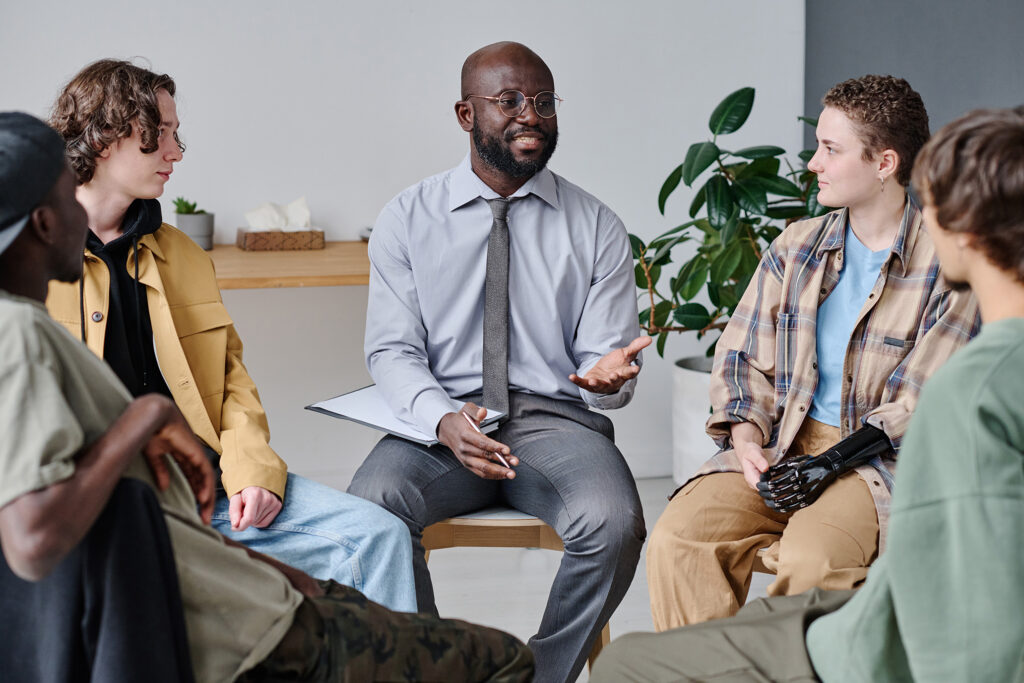Voyager Recovery Center in Lake Forest, CA, provides daily group therapy as a core part of detox and residential treatment, offering structured emotional support and peer connection.
What is group therapy? It’s a clinician-led psychotherapy model where small groups explore emotions, behaviors, and recovery strategies to build insight, accountability, and coping skills.
Group therapy at Voyager incorporates CBT, DBT strategies, psychoeducation, and wellness activities like meditation and yoga to support both emotional and physical recovery.
Benefits include increased social connection, accountability, real-time feedback, empathy, skill-building, and a stable daily routine that reinforces long-term recovery.

At Voyager Recovery Center in Lake Forest, California, group therapy isn’t just a weekly appointment—it’s a structured, powerful catalyst for mental health, wellness, and personal growth. Embedded in our detox and residential treatment programs, our daily group therapy sessions reunite clients with themselves and others in a safe, guided, supportive environment. Whether someone is navigating substance abuse, co-occurring mental health concerns, or seeking a more structured healing path, our groups deliver consistent support, peer connection, and meaningful insight.
With a full‑day schedule—beginning with morning meetings, midday process groups, and daily evening recovery circles—group therapy is central to how healing happens at Voyager. Blended with individual therapy, wellness activities, and reflective downtime, this balanced structure ensures both introspection and shared experience. Within minutes of the Orange County coast, clients rebuild emotional resilience and foster true well-being.
Group therapy is a clinically guided form of psychotherapy, where 6–12 individuals gather in person to explore emotions, behaviors, and recovery strategies under the care of licensed facilitators and mental health clinicians (PsyD, LCSW). Unlike informal support groups, this clinical model is rooted in evidence-based methodologies that effectively address mental health conditions such as OCD, ADHD, and eating disorders, as well as substance use challenges and relationship issues.
At Voyager, group therapy is an essential pillar of our treatment programs. Each session is designed to help clients recognize unhelpful thinking patterns, practice new coping mechanisms, and improve interpersonal awareness. Since every individual’s journey is different, groups are integrated into tailored treatment plans that respond to unique needs, including co-occurring disorders and medication management.
Voyager Recovery Center’s daily rhythm centers on connection, consistency, and collective support. Group therapy is woven into every day of both detox and residential care:
Morning – Setting the Tone for Healing
Afternoon – Deep Work & Emotional Growth
Evening – Reflection & Recovery Support
Daily at 6:30 PM, clients come together for a reflective recovery group, processing the day, sharing wins, addressing challenges, and reinforcing new coping skills
This structured format creates a living therapy model—clients learn, adapt, and apply emotional tools daily, supported by peers and experienced providers.
Although Voyager’s site doesn’t list separate specialty tracks, the programming incorporates proven therapeutic frameworks, including:
Each group is held in-person, in a supportive space that encourages vulnerability, accountability, and mutual support under the guidance of trained professionals.
Group therapy is a central component of modern recovery because it reconnects individuals to community and models healthy growth. Benefits include:
Social connection:
Reducing shame and fostering trust through shared experience
Immediate feedback:
Clients often recognize blind spots and gain insight from peer observations
Accountability:
Clients practice communication, emotional regulation, and problem-solving in real time
Empathy and perspective:
Understanding others’ journeys fosters empathy and broader awareness
Skill-building:
Being part of a group motivates individuals to follow through on daily treatment plan goals
Routine and stability:
Consistent sessions reinforce healthy patterns essential for long-term recovery
Whether tackling substance use, mental health issues, or rebuilding self-worth, group therapy offers structure, shared learning, and heartfelt connection.
Recognizing the interconnectedness of body and spirit, Voyager pairs group therapy with holistic wellness efforts. Clients participate in group-based activities such as:
By uniting emotional healing with group-based wellness, clients rediscover energy, restore health, and reinforce emotional resilience in shared spaces.
At Voyager Recovery Center, group therapy is fully integrated into detox and residential treatment, forming an immersive healing environment:
By concentrating on detox and residential care, Voyager creates an intensively supportive space that allows for continuous group therapy reinforcement throughout treatment.
Whether you’re reaching out for yourself or someone you love, you don’t have to do it alone. We’re here to listen, to guide, and to help you take that first step toward something better. Call us, ask questions, or just talk things through — no expectations, no pressure. Healing starts with a conversation. Let’s have it.
It’s a daily, clinician-led setting where people come together to share, learn, support each other, and practice recovery tools in a safe, structured space.
It builds connection, encourages accountability, offers real-time feedback, helps reduce isolation, and allows people to see how their thoughts and behaviors affect others.
Licensed clinicians (such as PsyD, LCSW, etc.) guide the groups, ensuring safety, confidentiality, good structure, and skillful facilitation.
There are a mix: process groups (digging into emotional or behavioral themes), psychoeducational groups (learning about mental health, relapse prevention, co-occurring diagnoses), wellness groups (meditation, yoga, mindfulness), and skills-based groups using CBT or DBT strategies.
Yes. You can start by listening. Facilitators help make the setting comfortable and non-judgmental, and over time people usually feel more confident participating.
It’s built into every day—morning, midday, evening groups—so emotional growth and connection happens alongside medical stabilization, wellness practices, and individual therapy.